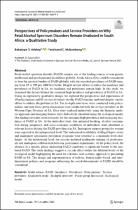| dc.contributor.author | Adebiyi, Babatope | |
| dc.date.accessioned | 2022-08-11T10:44:18Z | |
| dc.date.available | 2022-08-11T10:44:18Z | |
| dc.date.issued | 2021 | |
| dc.identifier.citation | Adebiyi, B. O., & Mukumbang, F. C. (2021). Perspectives of policymakers and service providers on why fetal alcohol spectrum disorders remain unabated in south africa: A qualitative study. International Journal of Mental Health and Addiction, doi:10.1007/s11469-021-00679-9 | en_US |
| dc.identifier.issn | 15571874 | |
| dc.identifier.uri | https://doi.org/10.1007/s11469-021-00679-9 | |
| dc.identifier.uri | http://hdl.handle.net/10566/7723 | |
| dc.description.abstract | Fetal alcohol spectrum disorder (FASD) remains one of the leading sources of non-genetic intellectual and developmental disabilities globally. South Africa (SA) could be considered to bear the greatest burden of FASD globally with the recorded prevalence of FASD ranging from 29 to 290 per 1000 live births. Despite several efforts to reduce the incidence and prevalence of FASD in SA, its incidence and prevalence remain high. In this study, we examined the factors behind the sustained high incidence and prevalence of FASD in SA. Using an exploratory qualitative design, we explored the perspectives and experiences of 10 policymakers and 65 service providers on why FASD remains unabated despite various efforts to address the problem in SA. Ten in-depth interviews were conducted with policymakers and nine focus group discussions were conducted with the service providers in the Western Cape Province of SA. Data were analyzed inductively using the thematic analysis approach and emerging themes were deductively classified using the ecological model. Our findings revealed several reasons for the sustained high prevalence and increasing incidence of FASD in SA. At the individual level, late antenatal booking, alcohol consumption during pregnancy, and socio-economic conditions of individuals were identified as relevant factors driving the FASD prevalence in SA. Inadequate support groups for women were reported at the interpersonal level. The widespread availability of illegal liquor stores and inadequate specialized prevention programs were reported as community-level challenges. At the institutional level, the reasons included inadequate training of professionals and inadequate collaboration between government departments. At the policy level, the absence of a specific policy addressing FASD constitutes a significant barrier to the unabated FASD. The study findings suggest a cascade effect within the different levels of the ecological model highlighting the need for a holistic and systemic approach to preventing FASD in SA. The design and implementation of holistic, human rights-based, and inter-department policies and programs addressing the social determinants of FASD should be considered. | en_US |
| dc.language.iso | en | en_US |
| dc.publisher | Springer | en_US |
| dc.subject | Ecological model | en_US |
| dc.subject | Focus group discussion | en_US |
| dc.subject | Service providers | en_US |
| dc.subject | Qualitative study | en_US |
| dc.subject | Prevalence | en_US |
| dc.title | Perspectives of policymakers and service providers on why fetal alcohol spectrum disorders remain unabated in South Africa: A qualitative study | en_US |
| dc.type | Article | en_US |

